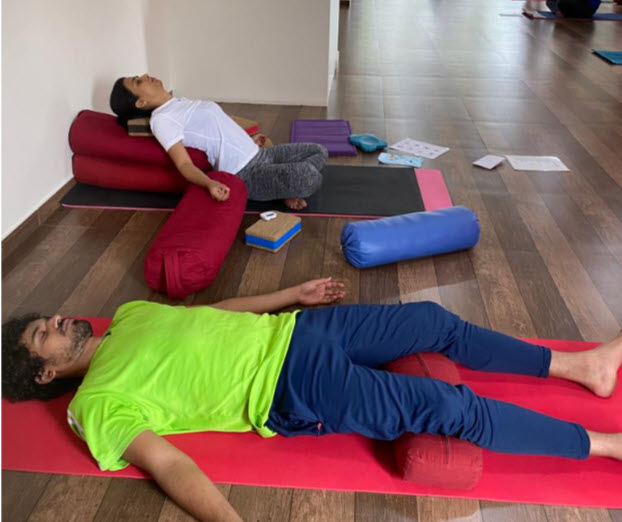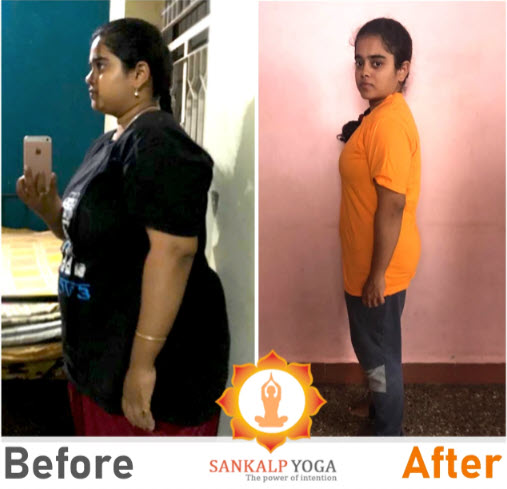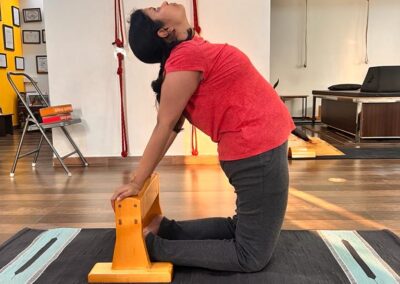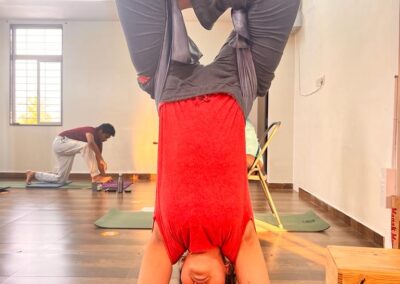Therapeutic Yoga
Unlock the transformative potential of therapeutic yoga.
Restore balance and well-being with expert-guided practices. Embrace healing on your wellness journey today by starting our Therapeutic Yoga.
“Therapeutic Yoga” is the flagship personalized Mentor-Mentee healing session at Sankalp Yoga. Any person with a long or short-term illness or any specific condition which they need to restore. The approach of the Therapy is Restorative in nature and is based on the founding belief that there is no ‘One size fits all.

Chronic Conditions
Find your way out from the vicious & exhausting circle of chronic disease. Learn how to make your body & mind stronger with the help of Yoga Therapy.

Cancer Management
Complementary mind & body therapy that may help cancer patients to manage the symptoms, adverse effects of the treatment & improve the quality of life.

Reproductive System Disorders
Explore the power of your femininity or masculinity, boost your fertility through strengthening your body and stress & anxiety removal.

Mental Health Problems
Bring back the lost balance & equanimity to the inner world of your mind. Gain mastery over the mind through complementary therapy of Yoga.

Body Weight Management
Together with Ayurveda & Yoga therapy understand your body type, discard the excess load or put up some healthy grams & sculpt your ideal healthy body.

Post-Traumatic & Restorative therapy
Complementary mind & body therapy that may help cancer patients to manage the symptoms, adverse effects of the treatment & improve the quality of life.

Back Pain
Remove the limitating factor of back pain out of your daily life. Experience the pain relief & regain your well-being with the gentle personalized practice of yoga therapy.

Occupational Diseases
Complementary mind & body therapy that may help cancer patients to manage the symptoms, adverse effects of the treatment & improve the quality of life.
Therapeutic Yoga Studio Gallery
Chronic Conditions
A chronic condition is described as a long term (more than 3 months) persisting illness or condition (syndromes, physical impairments, disabilities or some infectious diseases).
Therapeutic Yoga for Chronic conditions management
- Asthma
- Acquired immunodeficiency syndrome
- Autoimmune diseases (allergy, atopy, rheumatoid arthritis, multiple sclerosis, Crohn’s disease etc.)
- Cancer
- Cardiovascular diseases
- Chronic obstructive pulmonary disease
- Chronic pain syndromes
- Deafness and hearing impairment
- Degenerative syndromes
- Diabetes mellitus
- Disorders of digestive system (constipation, acidity etc.)
- Endometriosis
- Epilepsy
- Hepatitis C
- HIV (AIDS)
- Hypertension
- Hypothyroid & Hyperthyroid disease
- Migraine
- Obesity
- Osteoarthritis
- Osteoporosis
- Rheumatoid arthritis
- etc.
Risk factors
There are multiple factors which can cause the chronic disease outbreak. The biggest impact is having the health damaging behavior such as:
- unhealthy diet
- lack of physical activity
- bad sleeping habits
- high stress level
- use of addictive substances (alcohol, tobacco, drugs).
Therapeutic Yoga for chronic conditions
Use of yoga therapy in cases of chronic illnesses has been proven as very beneficial.
Proper asana and pranayama practice can reduce stress, anxiety, and fatigue in people living with chronic illness which has a direct impact on immune function improvement. Within the framework of yoga therapy the client is taught about self-management and how to maintain healthier life style according to his/her condition and body type.
Every yoga therapy program is continuously observed and regularly assessed by the Yoga therapist. This method is keeping the yoga healing program updated according to actual student’s needs, prevents the condition worsening and helping to lower the doses of medication.
Cancer Management
Cancer is described as disease that results when cells start dividing uncontrollably. Uncontrolled growth of the cells can lead to the tumor formation, damaging the immune system or other impairment which can be fatal. Cancerous cells are using oxygen and nutrients that would usually nourish other cells and they can spread over the body and cause metastasis in other tissues and organs. Once cancer is diagnosed the patient requires a special and usually long-term treatment which can include chemotherapy, radiotherapy and surgery. The patients has to face not only the cancer itself accompanied with psychological issues, but also the treatment itself which can have devastating impact on the patient’s health.
Therapeutic Yoga for the cancer management
Yoga is one of the suggested therapeutic activities which are helping to overcome the painful treatment regimens, exhausting post-treatment phases, body weakness, stress, anxiety and emotional trauma. It can come into picture during the diagnosis, treatment and post cancer management.
Therapeutic Yoga helps to:
- reduce the side effects of the radiations and chemotherapy
- reduce insomnia and improve the quality of sleep
- decrease the cancer-related fatigue
- restore the physical condition
- regain the lost appetite
- decrease the pain
- overcome and manage the stress
- reduce emotional distress
- reduce the anxiety associated with cancer
- lead the patient back to normal life
- regain the lost confidence thus increases the chance to overcome the disease and prevent the re-occurrence of the illness.
Reproductive System Disorders
Problems associated with reproductive can be divided into 3 groups.
1. Diseases of the female reproductive system
Cancer Affecting
- Ovaries
- Fallopian tubes
- Cervix
- Uterus,
- Vagina
- Vulva
- Breasts
Menstrual disorders such as:
- primary or secondary Amenorrhea (absent menstrual periods),
- Dysmenorrhea (severe and frequent menstrual cramps and pain during the period),
- Menorrhagia (heavy and prolonged menstrual bleeding),
- Polymenorrhea (too frequent periods), oligomenorrhea (infrequent or light periods),
- Metrorrhagia (any irregular, non-menstrual bleeding occuring between menstrual periods),
- Premenstrual syndrome (PMS),
- Premenstrual dysphoric disorder (PMDD),
- Post-menopausal bleeding
>> Endometriosis
>> Polycystic Ovary Syndrome (PCOS)
>> Polycystic ovarian disease (PCOD)
>> Primary ovarian insufficiency (premature ovarian failure)
>> Pelvic Inflammatory Disease (PID)
>> Prolapsed uterus
>> Uterine fibroids
>> Polyps in the pelvic cavity
>> Hormonal imbalance
>> Sexually transmitted diseases (STD)
2. Diseases of the Male reproductive System
>> Penile, testicular and prostate cancer
>> Erectile dysfunction
>> Enlarged prostate or benign prostatic hyperplasia (BPH)
>> Prostatitis
>> Varicocele or dilated veins around testicle
>> Hydrocele or fluid around testicle
>> Testosterone deficiency
>> Sexually transmitted diseases (STD)
3. Infertility
Infertility is defined as a couple’s inability to conceive after one year of unprotected intercourse. It can be caused by numerous conditions in one or both partners or a combination of circumstances.
Female infertility can be caused by:
- anovulation (failure to ovulate)
- oligoovulation (very irregular ovulatory cycles)
- blockage of the Fallopian tubes
- thyroid, pituitary, adrenal, or ovarian disease which may interfere with ovulation
- inability of successful delivery of a child
Male infertility can be caused by:
- no sperm production (azoospermia)
- very low sperm production (oligospermia)
- abnormal sperm cells production
- obstruction of the passageways for sperm
- abnormally low thyroid or high adrenal secretion
- varicocele
- lifestyle factors (diet, physical activity, use of alcohol or drugs, smoking etc.)
Risk Factors of infertility for both sexes:
- age
- drinking of alcohol, smoking, drug use
- overweight or obesity
- inappropriate diet or eating disorders
- exaggerated or lack of exercise
- emotional stress
- psychological issues (depression, anxiety etc.)
- hormonal imbalance
- cancer treatment
- chromosomal abnormalities or inherited diseases
- immunological factors
- sexually transmitted diseases (STD)
Therapeutic Yoga for reproductive system disorders
Yoga therapy helps to improve reproductive functions through the balancing of hormonal secretion, improving of circulation and internal organs function.
Reproductive health, sexual performance and ability to conceive is very much affected by psychological factors, thus the maintaining of the mental health of both partners is required. Stress reduces the likelihood of conception both natural way or with the help of assisted reproduction treatment. Yoga therapy is reducing stress and anxiety levels which can significantly increase the chances for successful pregnancy.
Especially beneficial can be supportive Yoga therapy for the couples undergoing IVF treatment. Well-designed asana and pranayama practice has been shown as increasing the success of assisted reproduction cycles.
Therapeutic Yoga is suitable for the couples as it results into deepening the connection between the partners, improvement of the relationship and enhancement of understanding for each other through the sharing of yoga experience.
In relation to women’s health yoga therapy is supporting the female well-being and vitality through the maintaining the regularity of menstrual cycles, strengthening the pelvic area, managing the weight, clearing out emotional blocks and bringing self-confidence to managing themselves.
Mental Health Problems
Many people are facing mental health problems, which are bringing them difficulties in daily life, emotional imbalance, distress or impairment of personal functioning. These problems often stays hidden and unsolved in fear of discrimination or stigmatization by the family or society.
Common mental disorders are:
- disrupted sleep patterns (insomnia)
- eating disorders (bulimia, anorexia)
- substances addictions (alcohol, smoking, drugs)
- cognitive disorders
- anxiety and panic attacks
- dealing with anger problems
- depression
- dissociation and dissociative disorders
- obsessive-compulsive disorder (COD)
- phobias
- postnatal depression and other perinatal mental health issues
- post-traumatic stress disorder (PTSD)
- schizophrenia
- low self-esteem
- self-harm or suicidal behaviour
- attention deficit hyperactivity disorder (ADHD)
- autism
- bipolar disorder
- impulse control disorders.
Therapeutic Yoga for mental disorders
Yoga practice has direct positive impact not only physical body, but also on mental condition of the practitioner. Traditional yogic view on mental disorders is that they are arising out of imbalances in the Manomaya Kosa (mental and emotional body) or having an origin in the Prana (life force) flow fluctuations.
For mental health improvement yoga therapy is helping in several ways:
- having impact on influence on neurotransmitters secretion (especially serotonin, which is responsible for the feeling of happiness ),
- bringing the practitioner to the stage of relaxation, where all negative urges are becoming less prominent,
- increasing awareness of oneself and oneself’s surroundings,
- increasing the ability to concentrate a manage the distraction,
- bringing an acceptance and adaptability,
- building up the sense of security,
- bringing enjoyment and self-confidence,
- can help to reduce the dosage of medicaments.
Post-Traumatic & Restorative Therapy
Highly traumatizing events in the human life (e.g. loss of the dear ones, witnessing or experiencing terrifying incident) can cause post-traumatic stress disorder (PTSD) which symptoms are severe anxiety, depression, uncontrollable thoughts about the event, flashbacks, nightmares and disability to manage normal day-to-day living. Person affected by PTSD may experience symptoms of avoidance, severe emotional distress or physical reactions, negative changes in thinking and mood and changes in physical and emotional reactions.
Restorative therapy is intended for anybody who is recovering from the serious illness or severe injury and wants to restore the functions of the body, heal mentally and emotionally and overall improve the quality of the life.
POST-TRAUMATIC & RESTORATIVE - Therapeutic Yoga
Restorative and post-traumatic therapeutic yoga is primarily based on the practice where body is opened through the passive stretching and energy is gradually brought back to the body. All asanas suitable for this kind of therapy are performed with the extensive use of props which ensures maximum support, effect and deep relaxation. Applied breathing techniques are gentle and creates calm and serene states of being.
Back Pain
Back pain is one of the most common problems which can have extensively negative impact on the daily life of the affected person. Back pain can have origin in injury, occupation, certain activities or habits or it’s a symptom of another type of health issues.
Back pain can be linked to:
- Spine (vertebrae, spinal joints)
- abnormal spinal curvature (hyper lordosis, hyper kyphosis, scoliosis)
- inflammation (e.g. ankylosing spondylitis)
- injury
- osteoporosis
- arthritis
- spinal stenosis
- spondylolisthesis
>> discs between the vertebrae
- damaged or ruptured disc
- bulging or herniated disc
- sciatica
- degenerative disc disease
- cauda equina syndrome
>> sprains caused by overstretching or tearing ligaments
>> strains in tendons
>> spinal cord and nerves
- radiculopathy
- compression, inflammation, injury
>> inflammation and wear of the sacroiliac joint
>> fibromyalgia
>> back, neck and shoulder muscles (spasm, strain, tension, injury)
>> abdominal and pelvic internal organs
- kidney stones or inflammation
- endometriosis, fibroids
- ulcerative colitis, appendicitis
- pancreatitis
>> the skin around the lumbar area
>> disorders of the aorta (abdominal aortic aneurysms)
>> tumors in the chest or spine
>> life style
- overweight or obesity
- sedentary life style
- lack of physical activity or overexercise
- poor body postur
>> occupational risk factors:
- strenuous physical work (heavy lifting, pushing, or pulling)
- sedentary job
- standing or driving for the long period of time
>> sleep disorders
>> pregnancy
Therapeutic Yoga for back pain
Relaxation of body and mind, caring awareness about the sensations in the body, body mechanics and proper alignment are the key factors in healing back pain though the yoga therapy. During the gentle therapeutic practice the correction of imbalances in the muscle flexibility and muscle strengthening is performed. Together with the slow and precise body movements the back pain is alleviating, the circulation of blood and prana (life force) is improved, inflammation is reduced and bones and joints are getting to be stabilized again.
The recovered body regains the proper posture, which, together with strengthened muscular system, help to prevent further pain or injury.
Body Weight Management
Body Mass Index (BMI)
Body weight can assessed be the calculating of so called Body Mass Index (BMI). The BMI value is derived from the mass (weight) and height of a person. Body mass index is also the measure of body composition. According to BMI every person can be broadly categorized as underweight, normal weight, overweight or obese.
Overweight and obesity
Overweight and obesity are defined as a body weight that is higher than what is considered as a healthy weight for a given body height. As overweight (BMI value is from 25 to 30) can be considered an excessive amount of fat as well as extra mass of bone, muscles or water. Obesity (BMI value is over 30) is usually caused only by excess of the fat tissue and this condition may impair health.
Main causes of obesity are:
- imbalance between the amount of consumed and expended calories
- bad diet habits (e. g. increased intake of energy-dense foods, irregular eating, overeating, quick switching of different types of diets)
- lack of physical activity and exercises
- sedentary nature of many forms of work
- social background and environment
- impact of genetics (e.g. Prader-Willi syndrome)
- hormonal disorders (under-active thyroid gland, polycystic ovary syndrome (PCOS), Cushing syndrome)
- stress, psycho-social and emotional factors
- sleep disorders
- use of some medications (diabetes, psychiatric illnesses, neurologic disorders, or inflammatory conditions treatment).
Risks of overweight and obesity
- diabetes mellitus type 2
- high blood pressure
- coronary heart disease (heart attack) and strokes
- kidney disease
- eye problems
- breathing problems (sleep apnea)
- asthma
- metabolic syndrome
- gallbladder diseases and stones
- fatty liver disease
- osteoarthritis
- gout
- increased risk of some types of cancer (endometrial, breast, colon, kidney, gallbladder and liver)
- pregnancy problems, such as high blood sugar during pregnancy, high blood pressure, and increased risk for cesarean delivery (C-section)
- mental problems (e.g. depression, anxiety, feelings of rejection, emotional strain etc.)
- social problems.
Underweight
Being underweight can be as risky as being overweight or obese. Underweight is defined as body weight which is too low than what is considered as a healthy weight for a given body height (BMI value is under 18.5). Weighing too little can contribute to a weakened immune system, fragile bones, poor stamina and feelings of fatigue. Underweight can be caused by various reasons and conditions. Each sudden and unexplained weight loss always require further medical examination and counselling.
Common causes of underweight are:
- malnutrition or bad eating habits
- eating disorders (bulimia, anorexia nervosa)
- sleep disorders
- gastrointestinal or liver problems causing inability to absorb nutrients adequately
- cancer or cancer treatment
- diabetes mellitus type 1
- over-active thyroid gland (hyperthyroidism)
- genetics
- metabolism
- drug use
- overexercise
- stress
Consequences of underweight:
- essential nutrients deficiency
- weak immune system
- anemia
- poor physical stamina
- muscle atrophy
- skin, hair or teeth problems
- menstrual disorders (e.g. amenorrhea, irrehular periods)
- infertility
- complications during pregnancy (e.g. premature delivery)
- osteoporosis
Therapeutic Yoga for body weight management
An assessment of body type according to Ayurveda is always done before the start of Yoga therapy practice. Diet and eating patterns are in detail analysed by Yoga therapist and a new diet program with proper timings is recommended.
Therapeutic Yoga isn’t traditionally considered an aerobic exercise, but it’s conserving energy and at the same time improving overall body condition (muscle strengthening, increasing flexibility etc.). Regular yoga practice is increasing awareness on many physical and mental levels which leads to more conscious approach towards the whole body even the eating habits itself. Practitioner is able to observe how different types of food are affecting his organism and change his behavioral patterns accordingly. Regular well-tailored yoga as therapy practice is balancing the hormonal secretion, helping with digestion issues, boosting stamina and improve the sleep which are all key factors for healthy weight maintenance.
Occupational Diseases
An occupational illness or work-related disease is health issue which arises directly from work activities or working conditions.
Types of work activities and factors which can cause occupational disease:
- repetitive or forceful work movements in constrictive postures
- work with arms lifted above shoulder height
- heavy lifting work
- work in a noisy environment
- manipulation with hazardous substances
- physical work in severe weather conditions
- work in extreme hot or cold temperatures
- using of information technology (computers, phones, watching screens) for hours
- jobs that required vigilance and responsibility for others
- work that required attention to devices
- sitting or standing for the long periods in combination with the poor body posture
- high level of occupational stress
- workplace mistreatment
Examples of work-related diseases:
- asthma
- allergy
- lungs diseases
- skin disorders (e.g. eczema, contact dermatitis, urticaria etc.)
- lead poisoning
- overuse syndrome
- computer vision syndrome
- cardiovascular disease
- high blood pressure
- muscoloskleteal disorders (back & neck pains, epicondylitis, cervical spondylosis, tendinitis, carpal tunnel syndrome, radial styloid tenosynovitis, hand-arm vibration syndrome, herniated discs/slipped discs)
- sleep disorders
- depression & anxiety
- migraine
- occupational burnout
- post-traumatic stress disorder
- cancers caused by chemical agents.
Therapeutic Yoga for Occupational diseases
Your content goes here. Edit or remove this text inline or in the module Content settings. You can also style every aspect of this content in the module Design settings and even apply custom CSS to this text in the module Advanced settings.












